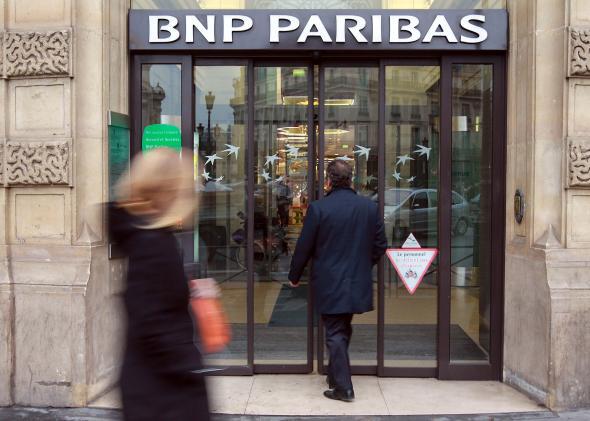Once again, U.S. regulators are bearing down on a top global bank. Last month, they wrung $2.6 billion in fines and a (somewhat meaningless) guilty plea from Credit Suisse for helping Americans evade their taxes. This time around, the target is France’s BNP Paribas, which has been under fire for allegedly violating U.S. sanctions by doing business with countries such as Iran and Sudan.
A final deal is still being negotiated, but the details that have leaked so far sound refreshingly punitive. Word has it that BNP Paribas may be forced to plead guilty and pay at least $8 billion in penalties, a sum larger than its entire 2013 profit. New York state’s top financial regulator may also suspend the bank’s ability to process certain transactions involving U.S. dollars, which could gum up its business and drive away clients. Some top executives could be forced to step down, as well. It’s not jail, but it’s more than a wrist slap. Standard & Poor’s is already warning that it might downgrade the bank’s credit rating over the fine.
Usually, prosecutors are criticized for being too lenient on banks in these sorts of bargains. But the possibility that BNP Paribas might actually come out of this skirmish with a cracked rib or two has given rise to another sort of indignation. At the Financial Times, my podcast partner Felix Salmon says the whole affair is “extraterritorial powermongering” by the United States. He notes that French political leaders, who are lobbying for mercy on behalf of BNP Paribas, are incensed partly because the bank did not break any of their own government’s laws.
“America is using its banking laws not to make its financial system safer, nor to protect its own citizens from predatory financial behaviour, but rather to advance foreign policy and national security objectives,” Salmon writes. This is particularly infuriating to world leaders who see it as evidence of a Yankee double standard. Our prosecutors are apparently unwilling to hold U.S. banks criminally accountable for the misdeeds that led to the financial crisis. Yet they’re happy to play world police. “The hegemon does whatever it wants, for its own, often inscrutable reasons,” Salmon writes, “and it does not enjoy being questioned about its decisions.”
This is not much of a case against prosecuting BNP Paribas (and I don’t think it’s intended as one). It would be geopolitically daft for the United States to let any bank that does business on our shores ignore sanctions, since the threat of cutting a country off from the global financial system is perhaps the most important nonviolent weapon we can still wield on the world stage. Rather, Salmon’s column is a very strong argument for the idea that if our government wants to maintain any moral legitimacy on the global stage, it needs to be as tough on U.S. financial institutions going forward as it is being on BNP Paribas today.
And the history of this case offers at least a glimmer of hope that it will be. As Bloomberg reports, U.S. prosecutors in Manhattan decided to become more aggressive in their dealings with large banks like BNP Paribas after concluding they had been too gentle with JPMorgan Chase over allegations that it failed to report its concerns about Bernie Madoff, who was a client. Preet Bharara, the U.S. attorney for the southern district of New York, had initially pushed for a criminal charge in that investigation, but ultimately relented when JPMorgan warned, as had plenty of banks before, that it might not survive an indictment.* Not wanting to risk the turbulence that a collapse might bring, the government settled for a fine, and JPMorgan’s board of directors rewarded CEO Jamie Dimon with a raise. That congratulatory pay hike struck prosecutors as an affront, Bloomberg explains. It left Bharara “seething” and seemingly determined not to repeat his mistake of letting a bank off too easy.
BNP Paribas, as Bloomberg explains, may now well be paying for Jamie Dimon’s raise. It doesn’t help the French bank’s case that, as in the Credit Suisse investigation, prosecutors appear to have an ironclad case. After the financial crisis, the Justice Department was cripplingly timid about bringing prosecutions that involved even the faintest hint of legal ambiguity, for fear of being beaten in court. But tax fraud is fairly cut and dried in the eyes of law enforcement, and not hard to explain to juries. The same goes for sanctions busting. To top things off, BNP Paribas dragged its feet in responding to investigators, and reportedly continued making illegal transactions after it claimed to have stopped, incurring further wrath from the Justice Department.
Given that context, the BNP Paribas case probably isn’t going to herald a new era of aggressive Wall Street prosecutions. But if and when an American bank commits a similarly obvious crime, it wouldn’t be surprising to see them pay a similarly respectable price. Consider it a baby step.
*Correction, June 6, 2014: This post originally misspelled the lat name of U.S. Attorney Preet Bharara.
